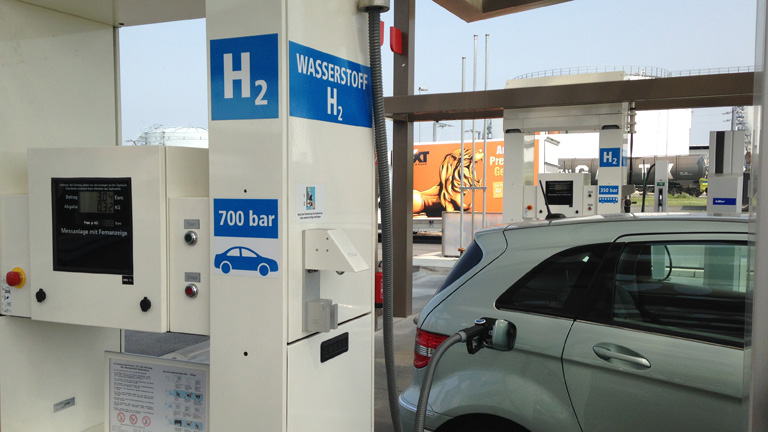
Source: Paulssen / BMDV
European Commission Vice President Margrethe Vestager announced the approval of the first 41 "IPCEI Hydrogen" projects today. Also included are four initial projects from Germany. Other projects from Germany are still in the approval process. The first four German projects may now receive state funding on the basis of this approval under state aid law. The Federal Ministry for Economic Affairs and Climate Action (BMWK) and the Federal Ministry for Digital and Transport (BMDV) have thus achieved an important success through close cooperation with industry, the European Commission and the 14 other European Member States involved. The two Federal Ministries had selected these four and other projects in 2021 in the expression of interest procedure for IPCEI Hydrogen (Important Project of Common European Interest).
Federal Minister for Economic Affairs Robert Habeck said:
Today we have taken a big step forward on the road towards ramping up the hydrogen economy in Germany. The four German projects are making an important contribution to the development of hydrogen technologies, focusing on the development of electrolysers and fuel cells. I am particularly pleased that we can take this important step together with the other countries involved. The projects are significant for the whole of Europe. But we still have a long way to go. Many other industrial, generation, infrastructure and mobility projects are waiting in the wings and have yet to be approved in order to develop a true hydrogen economy. The next step will now be to prepare the specific funding notices.
Federal Transport Minister Dr Volker Wissing said:
Hydrogen technology has the potential to organize mobility in a new and holistic way - from the production of energy to propulsion technology and refuelling infrastructure. With the IPCEI funding, we are offering German companies the opportunity for the first time to implement cross-border projects with European partners in the field of hydrogen and fuel cell technology. In this way, we are strengthening innovative capacity and global competitiveness in an economically difficult period - and creating new jobs in Germany.
The 41 integrated projects are part of the technology wave called "IPCEI Hy2Tech". They deal with technologies for the production, transport and use of hydrogen, particularly in the mobility sector. All projects go beyond the current state of technology. The intensive cooperation between the companies generates important impetus for the development of an integrated hydrogen economy in Germany and Europe and can only be initiated by government start-up financing.
The IPCEI Hydrogen is a European project involving a total of 24 Member States and Norway. In Germany, a total of more than eight billion euros in funding is available for the project, provided by the federal and state governments. Events since the start of Russia’s war of aggression against Ukraine once again highlight the importance of the IPCEI Hydrogen, which is also part of the German National Hydrogen Strategy, for the future of the energy sector and industry.
The technology and the industry wave are the first “waves” that have been discussed and further developed with the European Commission since August 2021. Today’s approval is for the technology wave. Approval of the industrial projects is expected in autumn of 2022, after which the funding notices can be issued. A third wave on infrastructure, for which proposals have already been submitted to the European Commission, is also of high importance for Germany. A fourth wave on mobility applications is in the works.
The approval under state aid law allows the BMWK to fund two projects:
"BoschPowerUnits" of Bosch is researching stationary fuel cell systems based on solid oxide. The systems are used for the modular and networked generation of electricity and heat using hydrogen. In the project, Bosch wants to take the final research and development steps on the way towards series production. The project is to be implemented at Bosch locations in Baden-Württemberg, Bavaria, and Saarland.
"Sunfire1500" of Sunfire GmbH is a production landscape that is eligible for funding. It brings alkali (AEL) and high-temperature (SOEC) electrolyzers into series production. The main investment location for the factories will be Saxony, for AEL also proportionally North-Rhine Westphalia (NRW). The various electrolysis technologies can thus be made available for widespread use. At the same time, the production is intended to serve as a blueprint for future European series production.
In addition, two projects selected by the BMDV were approved under state aid law:
Daimler Truck AG's "Pegasus" project aims to use fuel cell-based tractor/trailer combination drivetrains to decarbonise cross-border freight transport by road while maintaining the tractors' key performance criteria and flexibility. The practicality, reliability and technical maturity of these new drivetrains will be tested on several major logistics routes in the centre of the Europen Union.
EKPO Fuel Cell Technologies' "NextGen HD Stack" project will develop and drive commercialization of a new generation of high-performance fuel cell stack modules. In addition, the carbon footprint of production is to be significantly reduced. Apart from commercial vehicles, the main areas of application for the new stack technology are buses, marine and rail applications, and stationary power generation.